
-
Trouvez l’alimentation idéale pour votre animalDécouvrez quelle alimentation correspond aux besoins spécifiques de votre animal.Trouvez l’alimentation idéale pour votre animalDécouvrez quelle alimentation correspond aux besoins spécifiques de votre animal.Produits recommandés
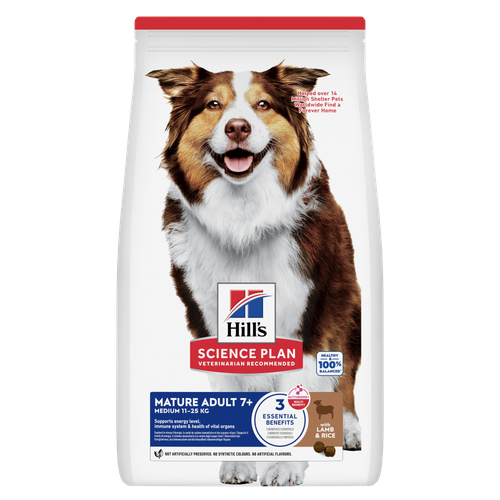 Mature - Croquettes pour Chien Mature - Moyenne Race
Mature - Croquettes pour Chien Mature - Moyenne RaceHill’s Science Plan Mature Adult - Croquettes pour Chien Mature à l’Agneau & Riz - Moyenne Race est un aliment complet spécialement formulé avec la technologie ActivBiome+ Multi-Benefit.
Cet aliment est spécialement formulé pour répondre aux besoins du chien vieillissant de moyenne race.Découvrir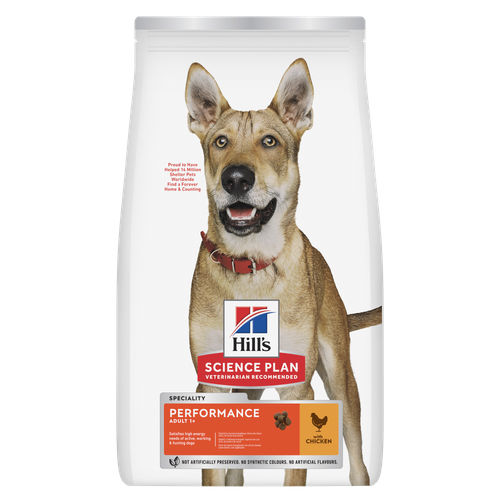 Performance - Croquettes pour Chien Adulte
Performance - Croquettes pour Chien AdulteHill’s Science Plan Performance - Croquettes pour Chien Adulte (1+) au Poulet est formulé pour répondre aux besoins énergétiques supplémentaires des chiens actifs, de travail et de chasse.
Découvrir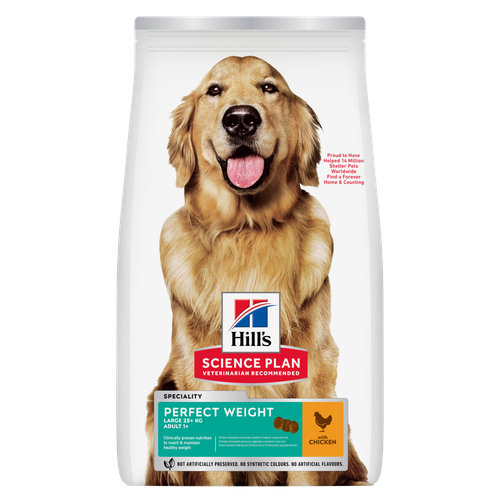 Perfect Weight - Croquettes pour Chien Adulte (1+) - Grande Race
Perfect Weight - Croquettes pour Chien Adulte (1+) - Grande RaceHill’s Science Plan - Perfect Weight - Croquettes pour Chien - Grande Race au Poulet est un délicieux aliment cliniquement prouvé pour aider le chien à atteindre et maintenir un poids sain.
DécouvrirProduits recommandés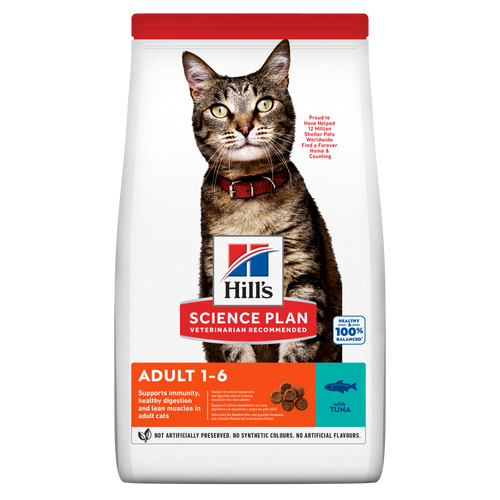 Croquettes pour Chat Adulte (1-6) - au Thon
Croquettes pour Chat Adulte (1-6) - au ThonHill’s Science Plan Adult - Croquettes pour Chat Adulte au Saumon est un aliment complet spécialement formulé avec la technologie ActivBiome+ Multi-Benefit.
Cet aliment est spécialement formulé pour répondre aux besoins énergétiques du chat pendant la période la plus active de sa vie.Découvrir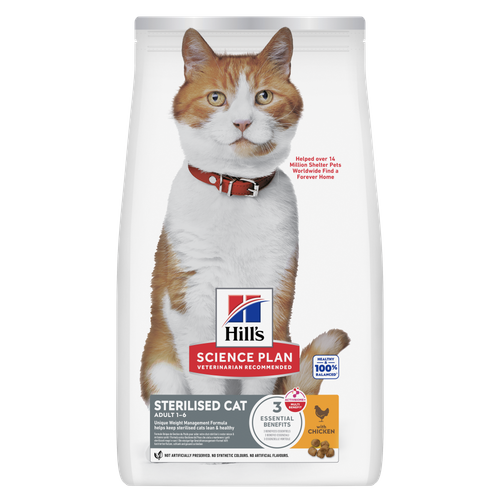 Sterilised Cat - Croquettes pour Chat Adulte Stérilisé
Sterilised Cat - Croquettes pour Chat Adulte StériliséHill’s Science Plan Adult Sterilised - Croquettes pour Chat Adulte au Poulet est un aliment spécialement formulé avec la technologie ActivBiome+ Multi-Benefit. Il s’agit d’un aliment équilibré, formulé pour répondre aux besoins du chat stérilisé, afin de l’aider à maintenir son poids de forme et à rester en bonne santé.
Découvrir Adult - Croquettes pour Chat Adulte
Adult - Croquettes pour Chat AdulteHill’s Science Plan Adult - Croquettes pour Chat Adulte au Poulet est un aliment complet spécialement formulé avec la technologie ActivBiome+ Multi-Benefit.
Cet aliment est spécialement formulé pour répondre aux besoins énergétiques du chat pendant la période la plus active de sa vie.Découvrir -
Pour chienPour chatArticles à la une
 Prendre la température de votre chat ou de votre chien
Prendre la température de votre chat ou de votre chienLe fait de savoir prendre la température de votre chien (ou de votre chat) fait partie de votre engagement envers sa santé.
En savoir plus Comment savoir si mon animal est en surpoids et que faire ?
Comment savoir si mon animal est en surpoids et que faire ?Obésité et surpoids de l’animal : comment les prévenir, comment les repérer et comment agir si votre animal est en surpoids grâce à l’exercice physique, au contrôle des portions et au contrôle des calories.
En savoir plus Variations de poids chez le chien et le chat : pourrait-il s’agir d’un trouble de la thyroïde ?
Variations de poids chez le chien et le chat : pourrait-il s’agir d’un trouble de la thyroïde ?Une variation de poids peut indiquer un problème de thyroïde. Découvrez les signes, les causes et ce que vous pouvez faire pour y remédier.
En savoir plus -
Allergies alimentaires et environnementales chez le chat
Allergies alimentaires et environnementales chez le chat
Votre chat présente-t-il des signes d’allergie alimentaire ou environnementale?
Si votre chat vomit fréquemment, a la diarrhée, souffre d'irritations cutanées, d’un pelage terne ou d’une perte de poils, il pourrait être sujet aux allergies alimentaires. Il peut également s’agir de signes d’allergie environnementale. Les symptômes les plus courants sont des troubles digestifs ou une irritation cutanée. Ces signes peuvent être récurrents et doivent être signalés à votre vétérinaire.














Quelles sont les causes des allergies chez le chat?
L’une des choses les plus difficiles sur le chemin de la guérison d’un chat est de déterminer la cause de ses allergies. Chez le chat, les allergies alimentaires sont causées par une réaction à un ingrédient particulier, en général une protéine. Les allergies alimentaires pouvant durer toute la vie, l’ingrédient en question doit être définitivement retiré de l’alimentation du chat.
Quelles sont les causes des allergies chez le chat?
L’une des choses les plus difficiles sur le chemin de la guérison d’un chat est de déterminer la cause de ses allergies. Chez le chat, les allergies alimentaires sont causées par une réaction à un ingrédient particulier, en général une protéine. Les allergies alimentaires pouvant durer toute la vie, l’ingrédient en question doit être définitivement retiré de l’alimentation du chat.


Allergies environnementales
Certains chats peuvent également réagir à des allergènes environnementaux : pollen, moisissure, acariens, piqûres d’insectes… L’élimination de l’allergène responsable ainsi qu’une approche multimodale peuvent permettre de réduire les signes indésirables des allergies environnementales chez le chat.


Allergies alimentaires
Un chat peut développer une intolérance à certains ingrédients. Un test d’éviction alimentaire supervisé par un vétérinaire permet d’identifier l’élément déclencheur. Un essai par éviction consiste à exclure progressivement les ingrédients suspects pour identifier celui responsable des réactions cutanées ou digestives. Heureusement, les allergies alimentaires sont rares chez le chat.
Prise en charge des allergies chez le chat
Il peut être difficile de prendre en charge les allergies d’un chat, et la première étape est une consultation vétérinaire pour établir un diagnostic précis. Il vous aidera à trouver la bonne combinaison d’alimentation, de médicaments et/ou de produits à application locale pour votre chat.


Confiance
Vivre avec un chat souffrant d’allergies alimentaires peut être un défi, aussi bien pour lui que pour vous. L’amélioration de son état demande du temps, de la patience et une collaboration étroite avec votre vétérinaire. N’oubliez pas : chaque chat est unique, tout comme les humains. La meilleure solution sera celle recommandée par un vétérinaire, en fonction des besoins spécifiques de votre animal. Ensemble, vous réussirez à aider votre chat à se sentir au mieux de sa forme.


Alimentation
Chez le chat, une alimentation spécifique joue un rôle essentiel dans la gestion des signes liés aux allergies. Une alimentation adaptée contribue à une peau en bonne santé de l’intérieur et aide à réduire les symptômes de votre chat, aussi bien à court qu'à long terme. Même avec un traitement, certains chats peuvent continuer à présenter des signes récurrents, nécessitant des ajustements au fil du temps. Votre vétérinaire restera votre meilleur repère pour assurer une prise en charge adaptée des allergies de votre chat.


Médicaments
Le vétérinaire peut prescrire des médicaments pour aider à soulager les signes d’allergie de votre chat. Si vous vous demandez ce que vous pouvez donner à votre chat contre les allergies, donnez-lui uniquement les médicaments recommandés par votre vétérinaire.


Produits à application locale
Des produits à application locale peuvent être utilisés pour contrôler les allergies du chat. Il existe différentes formes de produits à application locale, comme les shampooings, les lotions, les sprays ou les pommades. Consultez votre vétérinaire pour vérifier si un soin cutané spécifique convient à la peau de votre chat et à son stade de vie.


L'importance de l'alimentation dans la gestion des allergies alimentaires chez le chat
Demandez conseil à votre vétérinaire pour choisir l’alimentation la plus adaptée aux allergies de votre chat. Informez-vous sur les aliments diététiques pour chat formulés avec une nouvelle protéine ou une protéine hydrolysée , conçus pour réduire les risques de réaction allergique.


Quand faut-il consulter un vétérinaire?
Si vous observez des changements de comportement ou des signes inhabituels chez votre chat, une consultation vétérinaire peut être nécessaire.
Vous pouvez également demander à votre vétérinaire si une alimentation diététique serait appropriée pour votre chat. Les aliments Hill’s Prescription Diet sont développés par une équipe de nutritionnistes et de vétérinaires et ne peuvent être achetés que sur recommandation d’un vétérinaire. Prenez rendez-vous pour que le vétérinaire puisse évaluer la santé et les besoins nutritionnels de votre animal.
Aliments recommandés pour les chats présentant des allergies alimentaires et environnementales
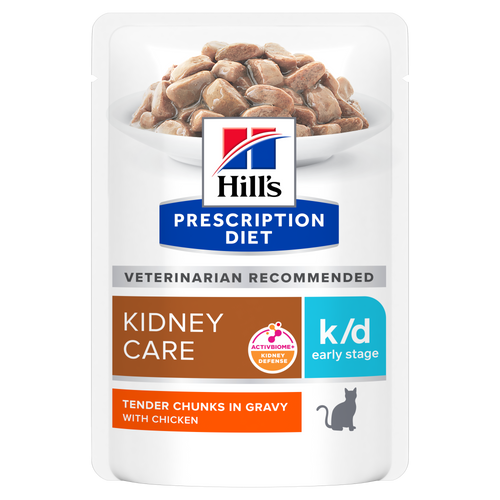
Délicieuse nutrition cliniquement prouvée pour améliorer la qualité de vie et prolonger la relation avec votre chat
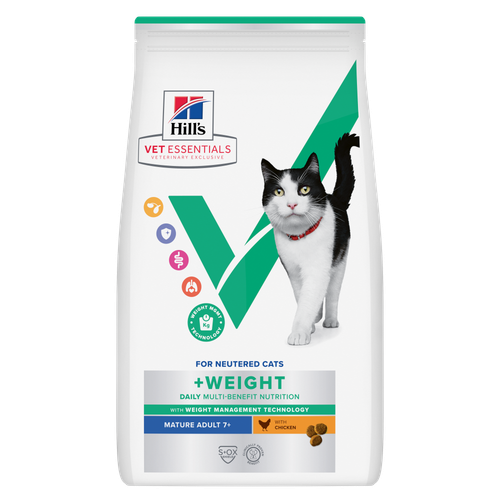
Hill's VET ESSENTIALS MULTI-BENEFIT + WEIGHT Croquettes pour Chat au Poulet (pour chats adultes matures âgés de 7 ans et plus, après la stérilisation ou pour les races prédisposées au surpoids) est une nutrition disponible exclusivement chez les vétérinaires, aux bénéfices multiples, formulée pour soutenir un poids optimal, la santé des organes vitaux et du système urinaire. Notre technologie unique de gestion de poids les aide à maintenir ou atteindre un poids optimal — pour un meilleur quotidien, aujourd'hui et demain.
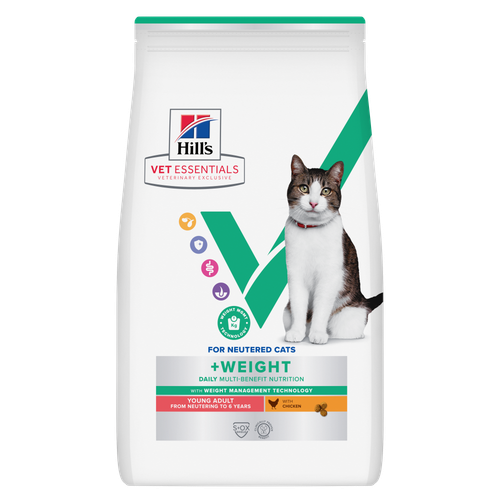
Hill's VET ESSENTIALS MULTI-BENEFIT + WEIGHT Croquettes pour Chat au Poulet (pour chats adultes stérilisés de 1 à 6 ans, après la stérilisation ou pour les races prédisposées au surpoids) est une nutrition disponible exclusivement chez les vétérinaires, aux bénéfices multiples, formulée pour soutenir un poids optimal, la santé des organes vitaux et du système urinaire. Notre technologie unique de gestion de poids les aide à maintenir ou atteindre un poids optimal — pour un meilleur quotidien, aujourd'hui et demain.
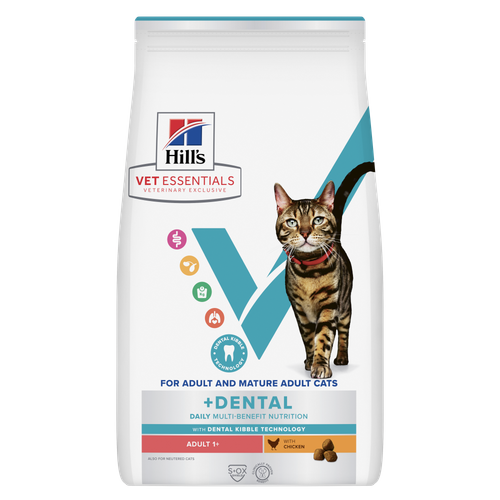
Hill's VET ESSENTIALS MULTI-BENEFIT + DENTAL Croquettes pour chat au Poulet (pour chats adultes et adultes matures âgés de 1 an et plus) est un aliment complet aux bénéfices multiples disponible exclusivement chez votre vétérinaire. Formulé avec une technologie de croquettes bucco-dentaires cliniquement prouvée pour réduire la formation de la plaque dentaire et du tartre lors de la mastication, pour des dents et gencives saines. Pour un meilleur quotidien, aujourd'hui et demain.

